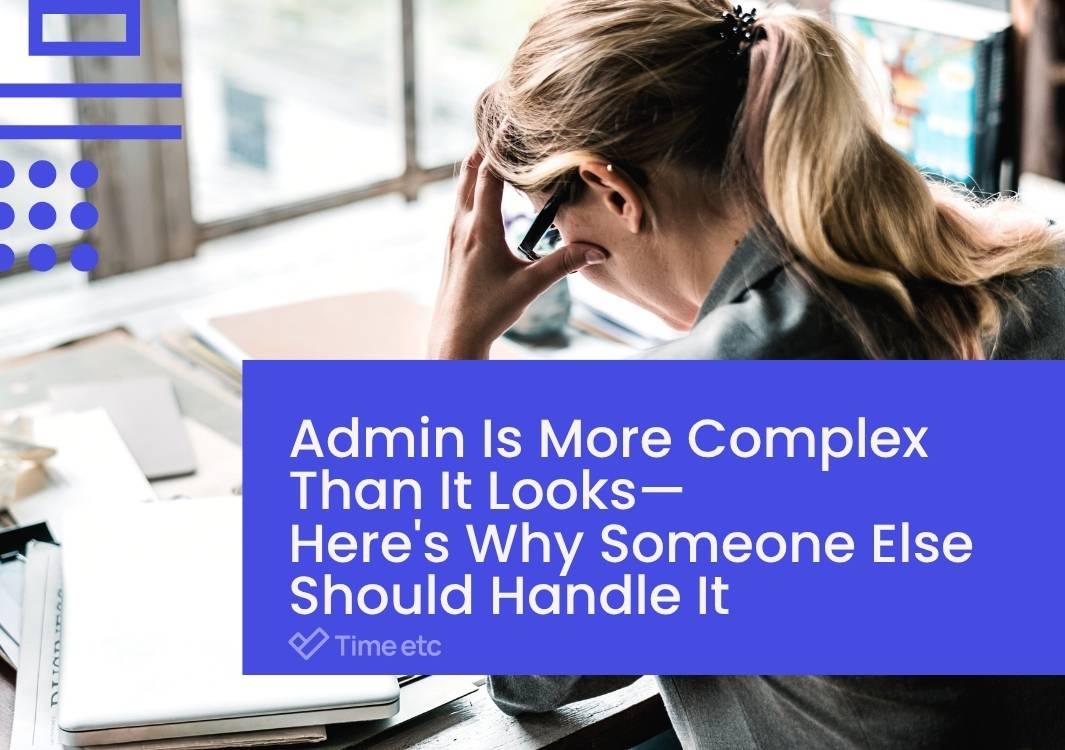Let's be honest: you didn't launch your own business because you were excited about filing receipts, updating spreadsheets, or sending follow-up emails for the third time. You started your journey because you had a problem to solve and a difference to make.
Yet, surveys show that entrepreneurs spend an average of 68% of their time on routine tasks rather than strategic work. And for many small business owners, a significant chunk of that time goes to admin work that feels like it should take ten minutes but somehow devours entire afternoons.
It's not that you can't do these tasks. Of course you can. But here's the truth most people won't tell you: there’s a lot more to admin than meets the eye. And every hour you spend wrestling with it is an hour stolen from the future you set out to create.
As Virgin Group founder Richard Branson put it, “Business opportunities are like buses; there’s always another one coming. But you won’t see them if you’re stuck doing paperwork.”
So, let's talk about why admin is so much harder than it looks, why even brilliant founders struggle with it, and what you can actually do about it.
The illusion of simplicity
It's ridiculously easy to brush admin off as "just" scheduling meetings, "simply" sending invoices, or "quickly" updating your customer database.
But here's the thing: that word "just" is doing a lot of heavy lifting.
Let's break down what admin actually involves, because once you see it clearly, you'll understand why it's been draining your energy and eating up so much of your time.
Multiple interconnected systems
Every single "simple" admin task typically requires working across three to five different platforms. Sometimes more.
For example, if you want to schedule a client meeting, you'll probably need:
- A calendar app to find available times
- A CRM to check client history and preferences
- Zoom or another video platform to generate the meeting link
- An email platform to send the invitation.
And that's just a starting point, all for one "quick" task!
Or consider processing an invoice. You're juggling accounting software, your banking app, the CRM, project tracking tools, tax compliance requirements, and payment processing platforms. Each system has its own login, interface, logic, and quirks.
And not only that, all these systems need to talk to each other. The data needs to match. When you update one, you often need to update three others. Miss one step, and you've created an inconsistency that'll confuse someone (probably you!) down the line.

Solid skill sets
Let's put this myth to rest: admin is not "unskilled work."
Professional administrative work demands a surprisingly sophisticated skill set:
- Technical proficiency: You need to navigate and maintain multiple platforms, understand how they integrate, troubleshoot when things break, and keep up with constant updates and changes.
- Data management: Every piece of information needs to be consistent and accurate across all your systems. One typo in a client name can create duplicate records that haunt you for months.
- Process optimization: Good admin means designing efficient workflows that save time and prevent errors. This requires systems thinking and continuous improvement.
- Compliance knowledge: Depending on your business, you're dealing with tax regulations, data protection laws (hello, GDPR), industry-specific requirements, and contractual obligations.
- Communication skills: Every email, every message, every document represents your business. Professional, timely, clear correspondence isn't automatic—it's a skill.
- Project coordination: Admin involves managing dependencies, tracking deadlines, coordinating between team members, and keeping multiple balls in the air simultaneously.
These aren't skills you pick up overnight. They're developed through focused practice and attention, which is exactly why specialists exist. The work may not always be glamorous, but it’s essential for any organization to run smoothly.
Context-switching
Here's something most people don't realize about admin work: the real cost isn't in the tasks themselves—it's in the switching between them.
Every time you jump from your email to your CRM to your accounting software, your brain pays a switching tax. Each system has different interfaces, different logic, and different requirements. You need to remember where specific data lives, what stage various projects are in, and which details matter for each task.
Then there's quality control. You're checking for errors across multiple touchpoints, catching inconsistencies, and making sure nothing falls through the cracks.
This constant context switching is cognitively expensive. Really expensive. Studies show it can reduce your productivity by up to 40% and increase errors significantly.
What this looks like for founders
Let's say you need to "just send a proposal" to a potential client.
Surface level: Write email, attach PDF, hit send. Five minutes, tops.
The reality:
First, you open your CRM to verify client details. What did you discuss in your last conversation? What pricing did you mention? What are their pain points again?
Then you create the proposal. Sure, you have a template, but it needs customization. The pricing needs to be accurate. The terms need to align with your current policies.
Next, you coordinate internally. Is your team actually available for this project? Do you have the resources? Better check with your project manager.
Legal review time. Do these terms comply with your current contracts? Are you exposed to any liability you haven't considered?
Now you set up follow-up systems. Reminders for checking in. Scheduled touches for the pipeline. Updates to the sales stage.
Finally, documentation. You log the activity, update the project status, and notify relevant team members.
Actual time investment: 45 to 90 minutes. Plus ongoing follow-up management.
And that's just one proposal. Now multiply that by every "quick" admin task on your to-do list.

The founder's dilemma
So if admin is this complex and time-consuming, why do smart, successful founders keep it on their plates for so long?
Great question. And the answer reveals something important about how we think about work, capability, and success.
The "I should be able to handle this myself" mindset
This is the voice in your head that says:
"Other successful people seem to have it all together."
"If I can build a company from nothing, admin should be easy."
"Asking for help with 'simple' tasks feels like admitting failure."
Founders are high achievers by nature, but if we're not careful, that mindset can backfire.
Here's why this thinking is flawed:
Different skill sets: Strategic thinking and operational execution are fundamentally different capabilities. Being brilliant at one doesn't automatically make you good at the other. You wouldn't expect your accountant to be great at sales, or your marketing person to handle legal contracts. Why expect yourself to excel at everything?
Energy allocation: High-level decision-making depletes your bandwidth for detail work. If you've spent the morning wrestling with a major strategic decision, your brain doesn't have much left for carefully updating spreadsheets, and vice versa.
Opportunity cost: Time spent on admin could generate vastly more value elsewhere. Every hour you spend formatting invoices is an hour you're not spending on strategy, sales, product development, or any of the things only you can do (more on this later!).
Specialization principle: Think about it: every other business function gets specialized help. You hire lawyers for legal work. Accountants for accounting. Marketing experts for marketing. Why should admin be any different?
ADHD and executive function challenges
Entrepreneurship attracts people whose brains thrive on stimulation, novelty, and risk. It’s no surprise, then, that research shows about 10% of entrepreneurs have ADHD (attention deficit hyperactivity disorder), which is more than double the rate in the general population.
While some traits can serve founders well—like creativity, high-energy, and out-of-the-box thinking—other traits can make administrative tasks particularly difficult.
Common struggles include:
- Working memory: Forgetting details that seemed clear five minutes ago.
- Task switching: Struggling to shift gears without losing momentum.
- Time estimation: Consistently underestimating how long things will take.
- Prioritization: Not knowing which out of your long list of tasks needs your attention.
- Sustained attention: Finding it hard to stick with repetitive or boring work.
And here's the important part: you don't need an ADHD diagnosis for this to apply to you. Many high-achievers share these struggles without meeting clinical criteria. If admin feels disproportionately difficult despite your obvious intelligence and capability, this might be why.

Creative minds vs. systematic processes
Creativity is nonlinear. It's intuitive, flexible, spontaneous. It thrives on novelty and possibility.
Admin, on the other hand, thrives on consistency, repetition, structure, and detail.
If you're a creative thinker (and most founders are), your creative brilliance often directly clashes with admin's need for structure. Your brain actively resists the kind of systematic, repetitive work that admin requires.
It's not that you're bad at it; it's that your brain is optimized for different work. And when you force yourself to do it anyway, you're working against your natural cognitive strengths.
The perfectionism trap
Perfectionism shows up in two particularly destructive ways for founders dealing with admin:
The "all or nothing" perfectionist
"If I can't do it perfectly, I won't do it at all."
This leads to procrastination and avoidance on admin tasks until they become urgent crises. You experience analysis paralysis when trying to choose the "perfect" system. You abandon good systems because they're not 100% ideal.
The control perfectionist
"No one else will do it exactly how I want it done."
This manifests as redoing work that's actually good enough but doesn't meet your impossibly high standards. You create overly complex standards that only you can meet. You micromanage every detail instead of delegating.
Either way, perfectionism will seriously slow down your work (making it take much longer than necessary) or lead to complete avoidance (because perfect execution feels impossible). Meanwhile, your strategic work—the stuff that actually grows your business—gets neglected while you pursue "perfectly done" admin tasks.
The return on investment for founders
Let's talk numbers, because this is where the cost of doing your own admin becomes crystal clear.
Strategic vs. administrative tasks
If you're a founder generating significant revenue, let's say your time is worth $200 to $500+ per hour. That's based on your actual revenue capacity—what you could be earning if you were focused on high-value activities.
Professional admin work costs $15 to $50 per hour.
If we do the math, every hour you spend on admin represents $150 to $450 in lost revenue opportunity.
Professional admin specialists vs. generalists
A professional admin doesn't just cost less per hour; they're also dramatically more efficient.
Systems knowledge: An admin professional knows optimal workflows, keyboard shortcuts, and integration tricks that can cut task time in half.
Technology mastery: Admin specialists master 5-10 platforms deeply and stay updated on new features. As a founder wearing so many hats in your business, you likely have surface-level knowledge of many different tools and constantly switch between learning modes.
Error reduction: Admin professionals follow established procedures and may catch quality, accuracy, and compliance issues before they become real problems. On the other hand, founders may make mistakes due to inexperience, miss deadlines, and create inconsistencies that cost them later.
Speed: What takes you 45 minutes might only take a specialist 10 minutes. They know exactly what they're doing, and they've done it a thousand times before.
Impact on mental bandwidth
Here's what most founders don't realize until they finally delegate their admin: the real benefit isn't just the time or the money savings.
It's the mental space.
When you're not carrying the cognitive load of incomplete admin tasks, several things happen:
Better strategic decisions: When your mind isn't cluttered with administrative details, you can think more clearly about big-picture strategy and direction.
Increased creativity: Creative thinking requires mental space. When you're not mentally tracking invoice due dates and calendar conflicts, your brain can actually do the innovative work you're best at.
Improved leadership: Leading your team effectively requires presence and energy. When you're not exhausted from context switching, you show up better for the people who need you.
Reduced stress: The constant background anxiety of uncompleted admin tasks affects everything. Knowing someone reliable is handling these details lifts a weight you didn't even realize you were carrying.
This is the difference between running your business from a place of reactive stress versus proactive strategy.

What's the bottom line?
Admin is complex, specialized work that requires specific skills, multiple systems, constant context switching, and significant mental bandwidth.
It's not something you're failing at because you're disorganized or incapable. You're struggling with it because it's genuinely difficult work that conflicts with the very cognitive strengths that make you a successful founder.
Every hour you spend on admin costs you hundreds of dollars in opportunity cost. A professional admin specialist can do the same work faster, better, and for a fraction of what your time is worth.
More importantly, outsourcing administrative tasks doesn't just buy you back time. It buys you back mental space, strategic clarity, creative capacity, and the ability to focus on the work that only you can do.
So, the question isn't whether you can handle your admin. Of course you can—you're capable of handling almost anything.
The real question is: should you?
And the answer, if you're honest about the true cost, is almost certainly no.
Ready to free yourself from admin overload?
Look no further than Time etc.
Why us? Because we know exactly what you're going through. More importantly, we know exactly how to help.
Our entire service is designed around one thing: making your life easier.
Here's a glimpse of what you get when you partner with us:
- Access to our talent pool of 7,000+ screened and vetted assistants
- Your own skilled assistant matched to your needs and ready to start in days, not weeks
- Top-tier security and data protection across our platform
- Up to 90% lower hiring costs than traditional hiring
- No daily hassle of managing your assistant—we do it all for you
- Add extra assistants at no extra cost when you need more hands
- Total flexibility—scale your support up or down anytime
- Our lifetime happiness guarantee—because your success is our success.
Sound good?
Just speak to our expert team to tell us what you need, and we’ll take it from there.
P.S. Want $150 off your first month of virtual assistant support? Answer a few quick questions to get personalized task recommendations and unlock your welcome discount. It takes just 2 minutes and could save you hours!











